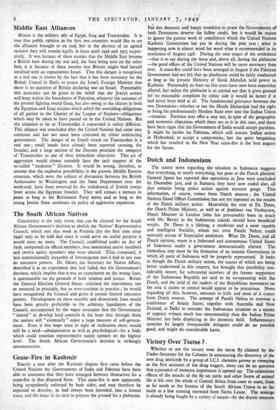The South African Natives
Consistency is the only virtue that can be claimed for the South African Government's decision to abolish the Natives' Representative Council, which met this week in Pretoria (for the first time since 1946) only to be told that since it could serve no useful purpose it would meet no more. The Council, established under an Act of 1936, cothprised six official members, four nominated native members and twelve native members who were elected. Thus composed, it was constitutionally incapable of intransigence and it had in any case no executive powers. Dr. Mears, the Secretary for Native Affairs, described it as an experiment that had failed, but the Government's decision, which implies that it was an experiment on the wrong lines, is questionable on the grounds of both wisdom and justice. &fore the General Election General Smuts criticised the experiment, not as unsound in principle, but as over-cautious in practice ; he would have reorganised the Council and given it certain limited executive powers. Development on these sensible and democratic lines would have been greatly preferable to the arbitrary liquidation of the Council, accompanied by the vague assurance that the Government " intend " to develop local councils in the hope that through them the natives will " eventually " enjoy a large measure of self-govern- ment. Even if this hope were in sight of realisation there would still be a need—administrative as well as psychological—for a body which could ventilate representative native opinion on the highest level. The South African Government's decision is strikingly unconstructive.






































 Previous page
Previous page